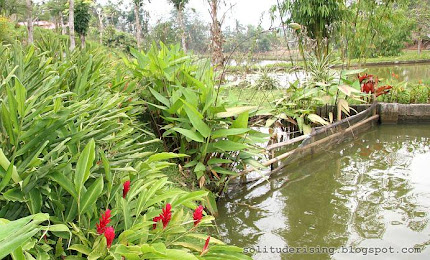
This is why it is called a 'Red Stem' Thalia. That glob attached to the stem are the eggs of an aquatic snail.
I ended my "Red Stemmed Thalia" post on a not so positive note. I wrote about how sickly and pitiful they looked after they have been divided, considering that they came to the farm looking very healthy and very proud.
The picture above shows how they look just days after they've been separated and relocated. The fishpond's water was so turbid because it was the height of a severe drought back then. Now the Thalias (a.k.a. "Water Cannas") are so robust. Below is a picture that shows how the they have grown one year after they have been "manhandled" and moved to their current location.
Unlike the terrestrial Canna, the Water Canna does not produce beautiful flowers. They are tiny and dangles at the end of a very long leafless stem. When they are all in bloom the bunch look unkempt. And the two plant species have nothing in common but the name "canna."
Thalias (both geniculata and dealbata) do not produce stunning flowers but for this particular type of Thalia one can certainly appreciate the foliage and the deep red stems. These are marginal or bog plants, meaning they grow well in wet soil or shallow waters. They are tall and elegant, a great plant for a significantly sized pond or water garden.
Aquatic plants provide a beneficial function in balancing a pond ecosystem. They absorb nutrients in the water which may be harmful to the fishes. Also, they provide habitat for other creatures. In our fishpond, snails climb up their stems and deposit their eggs there. Except for the unsightly clusters of eggs, the snails do no other harm to the plants.
The Thalias are due for another division. This means they have to suffer stress once again. I know they will survive, still whenever I see any of our beloved plants looking distressed I can't help but worry. But they're in the capable hands of my mother so I know they will be okay.





